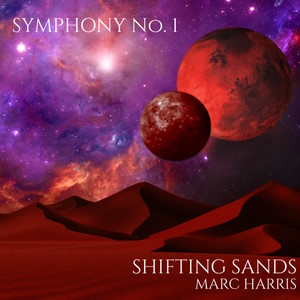
Marc Harris
Symphony No. 1 ‘Shifting Sands’ (2021)
Choir/Anna Beresford
Northern Film Orchestra/Melvin Tay
rec. 2021, Stoller Hall, London
Private release [49]
“The shifting sands will devour the temples of man.” That’s the superscription for this three-movement symphony for choir, orchestra and organ. So, is this a work that stands inspirational comparison with Shelley’s Ozymandias: “Two vast and trunkless legs of stone / Stand in the desert. … My name is Ozymandias, king of kings: / Look on my works, ye Mighty, and despair!” Harris’s selected words travel the same track-way. What of the music?
Self-published, and no doubt self-financed, this work is an ambitious entry into the classical “field of Mars” for composer Marc Harris. Harris embarked on this and two other substantial works – the Second Symphony to be issued in 2023 and a tone poem New Dawn – in the wake of the collapse of his Putney-based travel company. This calamity was coupled with the rise of the Covid-19 epidemic, global warming and associated thoughts on the fragility of man’s existence. It is dedicated to Harris’s “dear friend George Lebon, who sadly passed away in 2020”. According to some revealing notes on the Northern Film Orchestra’s website, “with invaluable guidance and advice from his mentor, Jo Reeves, Marc began developing and expanding his musical ambitions.” The work rose up to become a prodigally stated symphony for “a full orchestra and two dozen singers …. Jo gathered musicians from the Guildhall and Royal College of Music to perform the work in London to great acclaim in June 2021”. The forces used are real musicians: instrumentalists and singers – not an electronic simulacrum of the orchestral sound: a real orchestra. The audio-technical side has been extremely well managed with a superb open ambience.
Each movement has a vocal component of which the words (in the sung Latin and in English translation) are in the foldout card sleeve. The choral presence struck me as a for the most part discreet element. The orchestral writing takes the strain and the composer speaks of images of the Steppe, Arabia, the Serengetiand the rainforests. Harris asserts that he is a romantic and writes accordingly. He has no fear of melody nor of a degree of repetition. There is no atonality in this and little harshness; rather smoothness and some serenity.
The first of three very extended movements possesses determination and forward impetus. This alternates with a meditatively stirring mood which rises to striving rather than the splenetic fury that might have characterised expression of the inspirational sentiments. The second movement – where the music is drawn to warm Arabian sands and distance – is a shade more gripping. Harris’s “battered caravanserai” encompasses some familiar sound and character: Hovhaness’s stately brass statements and a Brucknerian sheen to the strings. At 8.33 he cogitates something poignant and later picks up on the restless forward motion of the first movement. The finale encompasses a self-satisfied meditative quality as it treks across limitless land expanses. Again, that Brucknerian tension surfaces mixed in with the sort of awe that speaks of hugeness and speed. At 9:50 strenuous fast music appears but this brassy assertion endures only for a minute or so. The organ at the end puts in an unmistakably grandiloquent appearance.
It might be me, but I rarely felt any tautness; still less any torment or any of the avowed howling back in rage at the powers of creation. The emotional contours are too smooth and for the most part deckle-edged or keenly stropped tragedy is instinct in the words set (printed in the 4-way-fold case with the composer’s notes) rather than the music. I have mentioned several composers but as a sketchy impression of the score’s burr and impact I would draw parallels with the music of John Barry (in the Beyondness of Things), Maurice Jarre, Christopher Gunning (the orchestral series on Chandos and Signum), Howard Blake or Alla Pavlova. For much of the time this might be a score to a David Attenborough television film series. Nothing untoward in that if you are in the mood to be soothed rather than provoked or stirred.
Rob Barnett
Availability: Artist’s website


















